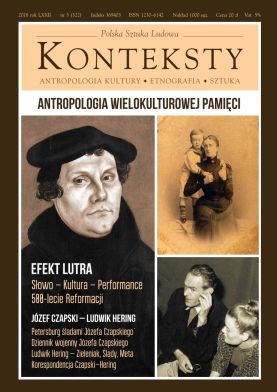Feministyczny efekt Lutra, czyli o edukacji śląskich ewangeliczek – szkic z antropologii historycznej
The Feminist Luther Effect, or on the Education of Silesian Evangelical Women – a Sketch from Historical Anthropology
Author(s): Grażyna KubicaSubject(s): History, Theology and Religion
Published by: Instytut Sztuki Polskiej Akademii Nauk
Keywords: Reformation;Protestantism;women;education;Silesia
Summary/Abstract: An analysis of the impact exerted by the Reformation upon the situation of women in Cieszyn Silesia with particular attention paid to the realisation of the idea of universal education, which remained one of the most important questions in the teachings of Martin Luther. Universal education involved children of both genders. It remains unknown whether schools established at the time of the Reformation in every Evangelical church in Cieszyn Silesia actually taught girls, but traces confirming this assumption do exist. During the Counter-Reformation this process was halted by the Austrian state. Nonetheless, already from the early eighteenth century Protestant women from Cieszyn Silesia could benefit from education first at the only church school in that region permitted by the Austrian authorities and situated in Cieszyn, and then, from the end of the eighteenth century, in churches established across the whole country in the wake of the passage of the Patent of Toleration. Emphasis is placed on the cultural role played by the alumnae for associations of girls and women, first German and then Polish. Their example makes it possible to follow the phenomenon of German cultural hegemony and the emancipation of the indigenous population. The author also presented the first female students born in Cieszyn Silesia: Elżbieta, Kornelia, and Adela Buzek, studying at the Jagiellonian University, and Edith Demel, attending the University of Vienna, whose literary works permit an analysis of the women’s ”own voice”; this is by no means a solitary voice but a mixture of the voices of subjugation and privileged status. Its example also shows the prominent role played by women’s solidarity. Significantly, those female pioneers of higher education, who proved capable of breaking down barriers (institutional and cultural) blocking women’s access to universities, were Protestants.
Journal: Konteksty
- Issue Year: 322/2018
- Issue No: 3
- Page Range: 55-69
- Page Count: 16
- Language: Polish
- Content File-PDF

